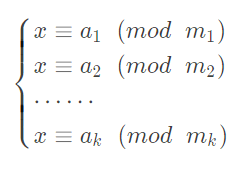中国剩余定理(CRT)
中国剩余定理是用于求解诸如:
$ $ $ $ $ $ $ $ 
形式的同余方程组的定理。其中 (m_1, m_2 ... m_k) 是两两互质的整数。
解法
设:
[M = prod^{n}_{i = 1}m_i , M_i = frac{M}{m_i} , t_iM_i equiv 1 (\% m_i)
]
统计答案:
[ans = sum_{i=1}^{n} a_iM_it_i
]
栗子
今有物不知其数,三三数之剩二(除以三余二),五五数之剩三(除以五余三),七七数之剩二(除以七余二)。问物几何?
根据刚才的算法来解决此问题:
(1.) 从 (3) 和 (5) 的公倍数中找到被 (7) 除余 (1) 的最小数 (15),从 (3) 和 (7) 的公倍数中找出被 (5) 除余 (1) 的最小数 (21),从 (5) 和 (7) 的公倍数中找出被 (3) 除余 (1) 的最小数 (70)。
(2.) 用 (15) 乘以 (2)(除以 (7) 的余数),(21) 乘以 (3)(除以 (5) 的余数),(70) 乘以 (2)(除以 (3) 的余数)。三个乘积相加得到 (15 * 2 + 21 * 3 + 70 * 2 = 233)。
(3.) 用 (233) 除以 (3, 5, 7) 三个数的最小公倍数 (105),得到的余数 (23) 就是该问题的答案。
Code
#include <iostream>
#include <cstdio>
#include <cstring>
#include <algorithm>
#define LL long long
using namespace std;
const int N = 233333;
LL n, x, y, ans = 0, Mul = 1, a[N], m[N], M[N], inv[N];
void exgcd(LL a, LL b)
{
if(b == 0) { x = 1, y = 0; return ; }
exgcd(b, a % b);
LL tx = x;
x = y, y = tx - (a / b) * y;
}
int main()
{
scanf("%lld", &n);
for(int i = 1; i <= n; i++)
scanf("%lld%lld", &m[i], &a[i]), Mul *= m[i];
for(int i = 1; i <= n; i++)
{
M[i] = Mul / m[i];
exgcd(M[i], m[i]);
x = (x % m[i] + m[i]) % m[i];
ans += x * a[i] * M[i];
}
printf("%lld", ans % Mul);
return 0;
}
扩展中国剩余定理(EXCRT)
扩展中国剩余定理是用于求解诸如:
$ $ $ $ $ $ $ $ 
形式的同余方程组的定理。其中 (m_1, m_2 ... m_k) 是不一定两两互质的整数。
解法
假设已经求出前 (k-1) 个方程组成的同余方程组的解为 (x),且有
[M = prod^{k-1}_{i=1}m_i
]
(其实这里的连乘不是连乘,而是取这些数的最小公倍数)
则前 (k-1) 个方程的通解为 (x+iM)((i) 是整数)
考虑加入第 (k) 个方程:我们需要求一个正整数 (t),使得
[x+tM equiv a_k (\% m_k)
]
[⇒tM equiv a_k-x (\% m_k)
]
转化后的该式右边可以看做常数,因此能使用 exgcd 求解。若对于某一个 (k),该方程无解,则这组数据无解。
注意做乘法时可能会爆,需要“龟速乘”。
Code
#include <iostream>
#include <cstdio>
#include <cstring>
#include <algorithm>
#define LL long long
using namespace std;
const int N = 2333333;
LL n, x, y, M = 1, ans = 0, m[N], a[N];
LL gcd(LL x1, LL y1) { y1 == 0 ? x1 : gcd(y1, x1 % y1); }
void exgcd(LL a, LL b)
{
if(b == 0) { x = 1, y = 0; return ; }
exgcd(b, a % b);
LL tx = x;
x = y, y = tx - (a / b) * y;
}
LL mul(LL a, LL b, LL mod)
{
LL res = 0;
while(b)
{
if(b & 1) res = (res + a) % mod;
a = (a + a) % mod;
b >>= 1;
}
return res;
}
int main()
{
scanf("%lld", &n);
for(int i = 1; i <= n; i++) scanf("%lld%lld", &m[i], &a[i]);
for(int i = 1; i <= n; i++)
{
x = y = 0;
LL A = M, B = m[i], C = ((a[i] - ans) % B + B) % B;
exgcd(A, B);
LL Gcd = gcd(A, B), bg = B / Gcd;
x = mul(x, C / Gcd, bg);
ans = ans + x * M;
M *= bg;
ans = (ans % M + M) % M;
}
printf("%lld", (ans % M + M) % M);
return 0;
}